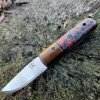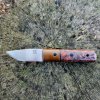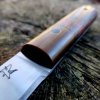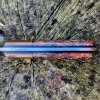PLackey
Knifemaker / Craftsman / Service Provider
- Joined
- Apr 1, 2010
- Messages
- 471
Sold - reduced due to cosmetic spalling in the paper micarta bolster
click here to view/order
grind: flandi
blade length: 3″
overall length: 7 1/4″
steel: 1/8″ 80CrV2 @ 61 Hc
handle: "Late Fall Shredded Burlap" with vintage milk chocolate paper micarta bolster. Black G10 liners and divider.
handle thickness: 4/5
hardware: black g10 pins and tube
Sheath not included.
The flandi grind is a flat grind with a scandi secondary bevel at 12 degrees per side. This grind works wood like a scandi, but will still slice like a flat grind. It's also easier to sharpen than a traditional scandi due to less material needing to be removed.
I began making PL knives in 2016. I've done leather work for over 20. I added kydex to my repertoire in the last 3 years. The heat treat on all of my carbon steel knives is done by me in a thermostatically controlled Evenheat knifemaking kiln. Each 80CrV2 blade goes through a 3 stage normalization before being heated to austenitic temperature and quenched in Parks 50 oil. Then it goes through a 2 stage tempering process. 80CrV2 Hardness is 60-61 hrc and my heat treat process produces a blade with extreme toughness and fine edge sharpenability. Scales are glued with West Systems G-flex epoxy. My aim is to produce heirloom quality tools with excellent craftsmanship that will provide a lifetime of enjoyment and service.




click here to view/order
grind: flandi
blade length: 3″
overall length: 7 1/4″
steel: 1/8″ 80CrV2 @ 61 Hc
handle: "Late Fall Shredded Burlap" with vintage milk chocolate paper micarta bolster. Black G10 liners and divider.
handle thickness: 4/5
hardware: black g10 pins and tube
Sheath not included.
The flandi grind is a flat grind with a scandi secondary bevel at 12 degrees per side. This grind works wood like a scandi, but will still slice like a flat grind. It's also easier to sharpen than a traditional scandi due to less material needing to be removed.
I began making PL knives in 2016. I've done leather work for over 20. I added kydex to my repertoire in the last 3 years. The heat treat on all of my carbon steel knives is done by me in a thermostatically controlled Evenheat knifemaking kiln. Each 80CrV2 blade goes through a 3 stage normalization before being heated to austenitic temperature and quenched in Parks 50 oil. Then it goes through a 2 stage tempering process. 80CrV2 Hardness is 60-61 hrc and my heat treat process produces a blade with extreme toughness and fine edge sharpenability. Scales are glued with West Systems G-flex epoxy. My aim is to produce heirloom quality tools with excellent craftsmanship that will provide a lifetime of enjoyment and service.




Last edited:
